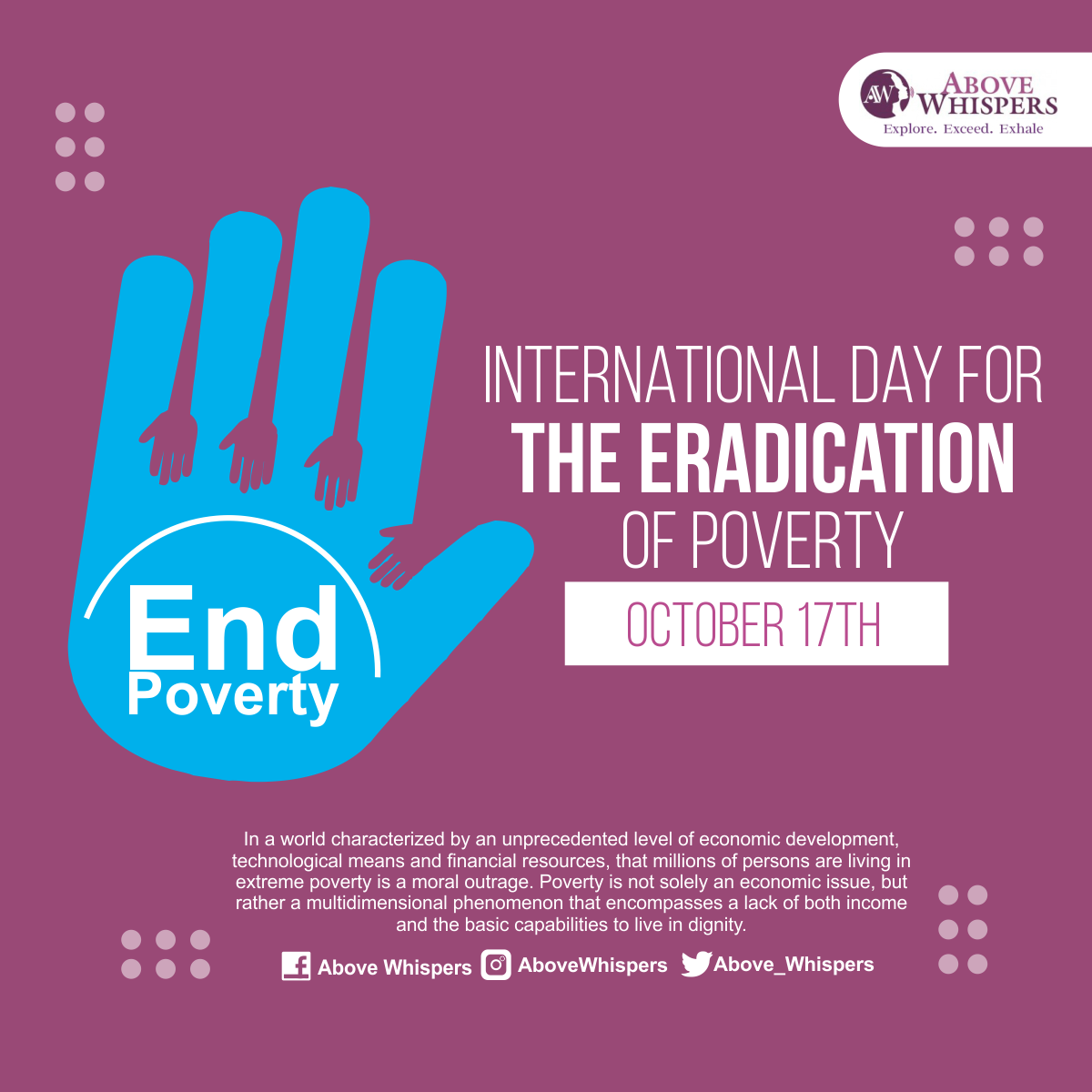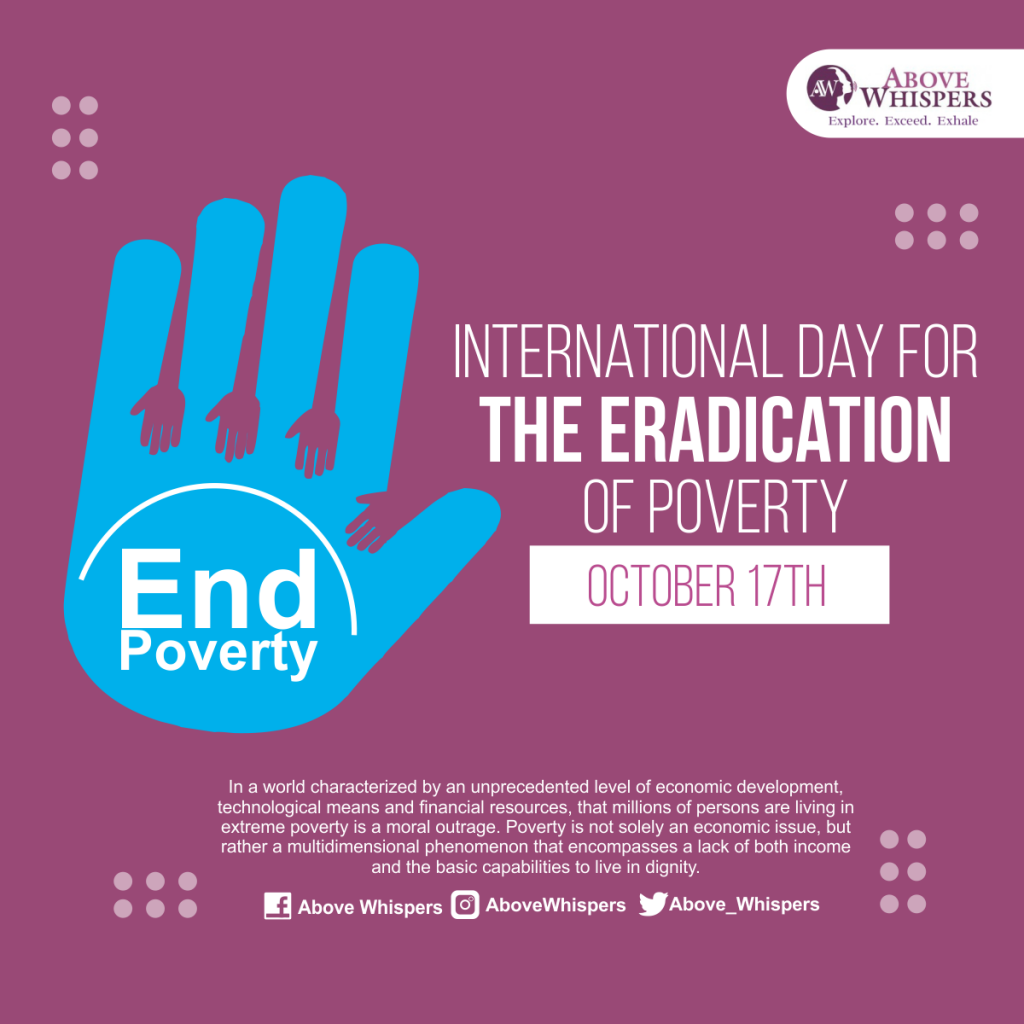
In a world characterized by an unprecedented level of economic development, technological means and financial resources, that millions of persons are living in extreme poverty is a moral outrage. Poverty is not solely an economic issue, but rather a multidimensional phenomenon that encompasses a lack of both income and the basic capabilities to live in dignity.
Persons living in poverty experience many interrelated and mutually reinforcing deprivations that prevent them from realizing their rights and perpetuate their poverty, including:
- dangerous work conditions
- unsafe housing
- lack of nutritious food
- unequal access to justice
- lack of political power
- limited access to health care
This year marks the 27th anniversary of the declaration by the General Assembly, on 22 December 1992, of 17 October as the International Day for the Eradication of Poverty. This year also marks the 32nd anniversary of the Call to Action by Father Joseph Wresinski — which inspired the observance of October 17 as the World Day for Overcoming Extreme Poverty — and the recognition by the United Nations of the day as the International Day for the Eradication of Poverty.
2020 Theme: Acting together to achieve social and environmental justice for all
The theme for the Day this year addresses the challenge of achieving social and environmental justice for all. The growing recognition of the multi-dimensionality of poverty means that these two issues are inseparably intertwined, and that social justice cannot be fully realized without aggressively rectifying environmental injustices at the same time. Whereas progress has been made in addressing income poverty, there has been less successful in addressing the other important dimensions of poverty, including the rapidly growing impact of the environment, within a more holistic approach.
People living in extreme poverty, often through sheer necessity, are the first to act decisively within their communities in response to poverty, climate change and environmental challenges. However, their efforts and experience often go unnoticed and unappreciated; their ability to contribute positively to solutions has been overlooked; they are not recognized as drivers of change, and their voices are not heard, especially in international bodies.
This must change. The participation, knowledge, contributions and experience of people living in poverty and those left behind must be valued, respected and reflected in our efforts to build an equitable and sustainable world in which there is social and environmental justice for all.
Background
The observance of the International Day for the Eradication of Poverty can be traced back to 17 October 1987. On that day, over a hundred thousand people gathered at the Trocadéro in Paris, where the Universal Declaration of Human Rights was signed in 1948, to honour the victims of extreme poverty, violence and hunger. They proclaimed that poverty is a violation of human rights and affirmed the need to come together to ensure that these rights are respected. These convictions are inscribed in a commemorative stone unveiled on this day. Since then, people of all backgrounds, beliefs and social origins have gathered every year on October 17th to renew their commitment and show their solidarity with the poor. Replicas of the commemorative stone have been unveiled around the world and serve as a gathering place to celebrate the Day. One such replica is located in the garden of United Nations Headquarters and is the site of the annual commemoration organized by the United Nations Secretariat in New York.
Through resolution 47/196 adopted on 22 December 1992, the General Assembly declared 17 October as the International Day for the Eradication of Poverty and invited all States to devote the Day to presenting and promoting, as appropriate in the national context, concrete activities with regard to the eradication of poverty and destitution. The resolution further invites intergovernmental and non-governmental organizations to assist States, at their request, in organizing national activities for the observance of the Day, and requests the Secretary-General to take, within existing resources, the measures necessary to ensure the success of the Day’s observance by the United Nations.
17 October presents an opportunity to acknowledge the effort and struggle of people living in poverty, a chance for them to make their concerns heard, and a moment to recognize that poor people are the first ones to fight against poverty. Participation of the poor themselves has been at the centre of the Day’s celebration since its very beginning. The commemoration of October 17th also reflects the willingness of people living in poverty to use their expertise to contribute to the eradication of poverty.
Building a sustainable future requires us to intensify our efforts towards eradicating extreme poverty and discrimination, and ensuring that everyone can fully exercise their human rights. The full participation of people living in poverty, particularly in the decisions that affect their lives and communities, must be at the centre of policies and strategies to build a sustainable future. In this way, we can guarantee that our planet and our societies can fulfil the needs and aspirations of everyone – not only those of a privileged few – for this and future generations.
Therefore, it is appropriate that the theme — chosen by the United Nations, in consultation with people living in poverty and civil society organizations — recognizes that all people must come together to end poverty and discrimination in order to build a sustainable future in which the needs of the present are met without compromising the ability of future generations to meet their own needs.
Accelerating global actions for a world without poverty
In its resolution 72/233, the General Assembly proclaimed the Third United Nations Decade for the Eradication of Poverty (2018–2027). It also considered that the theme of the Third Decade, to be reviewed at its seventy-third sessions, should be “Accelerating global actions for a world without poverty”, in line with the 2030 Agenda for Sustainable Development. The core of the present report consists of an inter-agency, system-wide plan of action for poverty eradication to coordinate the efforts of the United Nations system, as well as recommendations concerning how to make the Third Decade effective.

